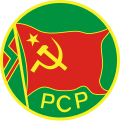| Portuguese Communist Party |
|---|
 |
This is a table of the electoral results of the Portuguese Communist Party . Despite the Party had been founded in 1921, the party experienced little time as a legal party, being forced into clandestinity after a military coup in 1926. In the following decades, Portugal was dominated by the dictatorial regime led by António Oliveira Salazar, that kept the Party illegal. Although the regime allowed elections during some periods, the Party, given its illegal status, could never legally enter the electoral process and the heavy manipulation of the electoral results never allowed a democratic candidate to win. The regime would only end in 1974, with the Carnation Revolution, that implemented broad democratic changes in the country.
Contents
- Results
- Results in parliamentary elections
- Results in local elections
- Results in European Parliament elections
- Results in presidential elections
- See also
- References
- External links
Since then, four types of elections are held with different periodicity. The head of state, the President of the Republic, is elected for a five-year term, the Parliament is elected for a four-year term, like the municipal administrations, that since 1985, are also elected for a four-year term. Azores and Madeira elect a regional parliament each four years. Along with these, European elections are also held with a periodicity of five years since the country joined the European Union in 1986.
Since the revolution, the Party participated in every election, from the late 1970s until 1987, it ran in coalition with the Portuguese Democratic Movement in the United People Alliance (APU). In 1987, the APU was disbanded and since then, the Party participated in coalition with the Ecologist Party "The Greens" (PEV) inside the Unitary Democratic Coalition (CDU). The peak of the Party's electoral influence was from the Carnation Revolution until the early 1980s, since then, and mainly after the fall of the Socialist bloc in eastern Europe, the Party's electoral success was reduced, however, it still keeps a presence in the Parliament and still holds the presidency of 18 municipalities and several parishes.


